Project management principles provide essential direction for teams navigating complex initiatives. Without these guiding principles, even the most talented teams can drift off course, miss deadlines, and fail to deliver expected results.
This article breaks down the 10 core project management principles that every leader needs to master for consistent success. From setting clear objectives to embracing continuous improvement, these principles form the foundation of effective project delivery — principles that monday work management was built to support and enhance.
Try monday work managementWhat are project management principles?
Project management principles are foundational guidelines that provide structure and direction for planning, executing, and completing projects successfully. These principles serve as a compass for project managers and teams across all industries.
The principles of project management apply universally, creating a common language and framework that enables consistent results. When properly implemented, these principles transform chaotic work into streamlined execution.
Why principles matter
Project management principles help organizations in several key ways:
- Strategic alignment: Ensuring projects support broader business goals
- Resource optimization: Allocating people and budgets effectively
- Risk reduction: Anticipating and mitigating potential issues proactively
According to PMI’s 2021 Pulse of the Profession report, organizations that adhere to established project management principles complete 2.5 times more projects successfully than those without structured approaches.
Why clarity and goals matter first
Clear objectives form the foundation of successful project management. Without well-defined goals, projects drift aimlessly, consuming resources without delivering value. Would you start a journey without knowing your destination?
Ambiguous goals often lead to scope creep and project failure . For example, “Improve our website” lacks specificity, while “Launch a new customer portal by Q3 with a 95% customer satisfaction rate” provides clear direction.
The SMART framework ensures project goals are actionable and measurable:
- Specific: Clearly defined scope and deliverables
- Measurable: Quantifiable success criteria
- Achievable: Realistic given available resources
- Relevant: Aligned with organizational objectives
- Time-bound: Fixed timeline with clear deadlines
Teams using platforms like monday work management can define clear goals on a centralized platform that make objectives visible to everyone, ensuring alignment from day one.
How to structure and scope your projects
Creating a structured project framework is essential for success. Proper scoping prevents common pitfalls like missed deadlines, budget overruns, and team burnout.
The tenets of project management emphasize the importance of thorough planning before execution begins. This planning creates clarity and direction for everyone involved.
Key structural elements of a well-scoped project include:
- Project charter: Defines purpose, objectives, and high-level requirements
- Work breakdown structure: Divides complex projects into manageable components
- Timeline development: Creates realistic schedules with dependencies and milestones
- Resource allocation: Assigns appropriate team members to each component
monday work management helps teams structure such projects with visual workflows that make complex initiatives easier to understand and manage.
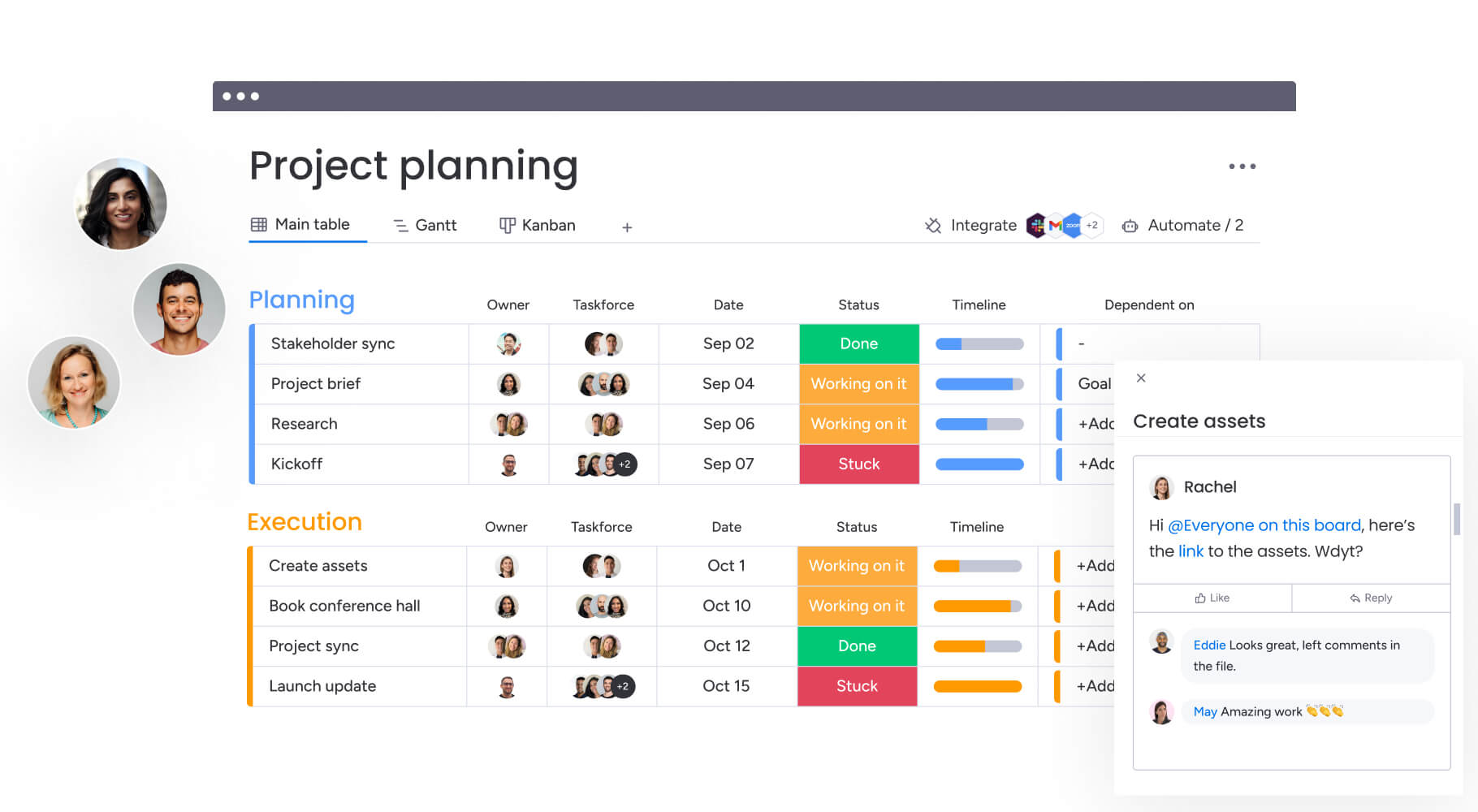
Ensuring stakeholder engagement and ownership
Stakeholder involvement throughout the project lifecycle is critical for success. Who needs to be informed, consulted, or directly involved in decisions?
Effective stakeholder management requires clear communication channels and defined roles. When stakeholders understand their responsibilities, they’re more likely to provide timely feedback and support.
| Effective engagement | Ineffective engagement |
|---|---|
| Early involvement | Last-minute consultation |
| Clear communication channels | Ad-hoc updates |
| Defined decision authority | Unclear approval processes |
| Regular feedback loops | One-way communication |
The principles in project management highlight the need for transparency and regular stakeholder updates. monday work management facilitates this with customizable dashboards that provide real-time updates, keeping everyone informed without requiring constant meetings.
Monitoring risks and dependencies
Proactive risk management keeps projects on track by identifying potential issues before they impact timelines or deliverables. What could go wrong with your project, and how will you handle it?
Program management principles emphasize continuous risk monitoring throughout the project lifecycle. This ongoing vigilance allows teams to adapt quickly when conditions change.
The risk management process includes four essential steps:
- Risk identification: Brainstorming potential issues using techniques like SWOT analysis
- Impact assessment: Evaluating each risk’s severity and likelihood
- Mitigation planning: Developing risk mitigation strategies to address high-priority risks
- Continuous monitoring: Tracking risk status and implementing contingency plans
Dependencies between tasks create additional complexity in project management. When one task relies on another, delays can cascade throughout the timeline.
monday work management’s risk assessment features are great in helping teams visualize and track both risks and dependencies, making it easier to anticipate problems before they derail the project.
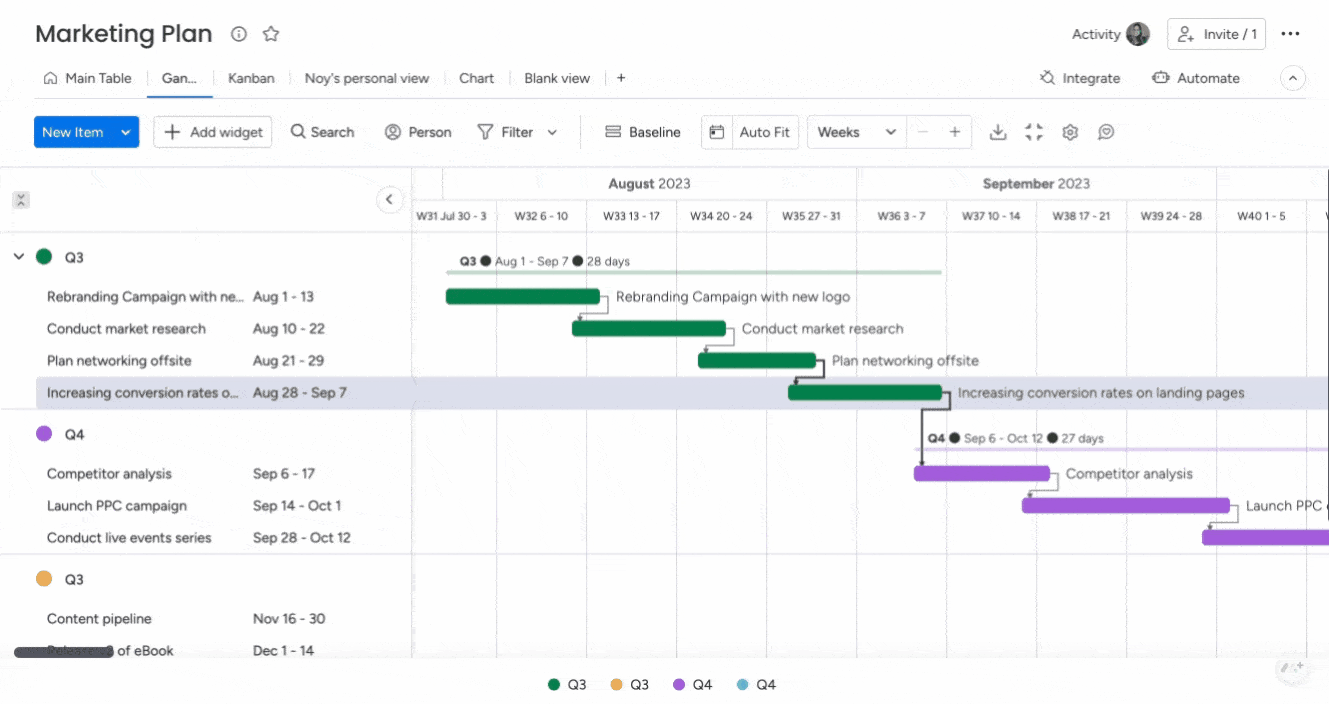
Communicating progress and accountability
Transparent communication forms the backbone of successful project execution. How will your team know if they’re on track without regular updates and clear metrics?
Project management concepts stress the importance of regular updates and clear ownership. When team members understand their responsibilities, they deliver quality results on time.
Effective project communication includes:
- Regular status updates: Keeping stakeholders informed of progress and challenges
- Clear responsibility assignment: Defining who owns each deliverable
- Visibility into blockers: Highlighting issues that need resolution
- Milestone celebration: Acknowledging achievements to maintain momentum
One way to enhance team accountability is by using monday work management built-in notification systems and @mentions that keep everyone in the loop in one central place, once again eliminating the need for excessive meetings.
Periodic reviews and continuous improvement
Regular project assessment ensures teams adapt and improve throughout the project lifecycle. Are you learning from each phase of your project, or repeating the same mistakes?
The 7 principles of project management include continuous improvement as a core concept. By regularly reviewing progress, teams identify what’s working and what needs adjustment.
Project reviews come in several forms:
- Sprint/phase reviews: Assessing short-term progress against planned deliverables
- Milestone reviews: Evaluating major achievements and realigning priorities
- Retrospectives: Learning from completed work to improve future performance
- Post-project analysis: Capturing lessons for organizational knowledge
Applying the 10 core project management principles
Now, let’s examine how to put these principles into action. The 12 project management principles established by PMI provide a comprehensive framework, but we’ve distilled the most essential ones into 10 core principles.
1. Define clear objectives
Create measurable, specific project goals that everyone understands and supports. Vague objectives lead to confusion, while clear goals provide direction.
For example, instead of “improve customer service,” a clear objective would be “reduce customer response time by 30% within six months by implementing a new ticketing system.”
monday work management helps visualize objectives with goal-tracking features that keep teams focused on priorities.
2. Create a structured plan
Develop a comprehensive project plan with clear phases, deliverables, and dependencies. Breaking down complex projects makes the work more manageable.
Accurate time and resource estimation helps prevent surprises and keeps the project on track. Consider past performance and build in buffer time for unexpected challenges.
Gantt charts are an effective way to visualize project timelines and dependencies, making it easier to create realistic plans.
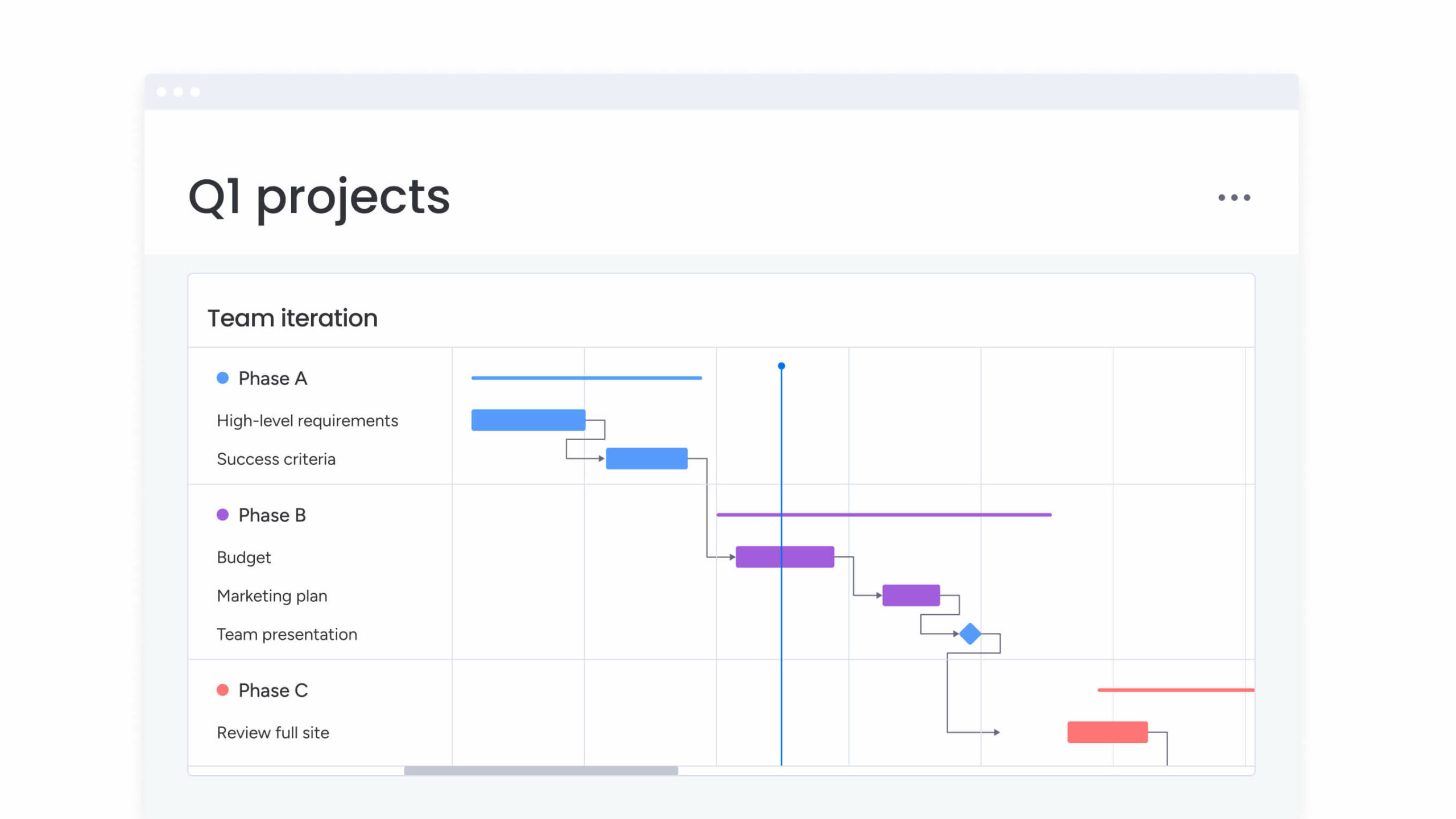
3. Assign roles and responsibilities
Clearly define who is responsible for each task and decision to eliminate confusion and ensure accountability. The RACI framework (Responsible, Accountable, Consulted, Informed) clarifies roles effectively.
Matching team skills to project needs optimizes performance and increases success likelihood. Consider both technical abilities and soft skills when assigning responsibilities.
4. Manage scope and changes
Use effective scope management techniques to keep projects focused on delivering agreed-upon objectives. Document the project scope clearly and get stakeholder approval before beginning.
Handle change requests systematically to prevent scope creep while allowing necessary adjustments. Evaluate each proposed change for its impact on timeline, budget, and resources.
5. Set up effective communication
Plan communication for different stakeholder groups based on their information needs. Who needs what information, and when do they need it?
Choose appropriate channels and frequency for updates to keep everyone informed without causing information overload. Some stakeholders need detailed daily updates, while others prefer weekly summaries.
Centralized project communication creates a single source of truth that reduces misunderstandings.
6. Identify and monitor risks
Use systematic processes to identify risks early, before they impact the project. Risk identification workshops, checklists, and historical data help uncover potential issues.
Create contingency plans for high-priority risks so you’re prepared if problems arise. Assign risk owners to ensure someone is responsible for monitoring each identified risk.
Automations can alert teams to emerging risks, enabling proactive management rather than reactive crisis response.
7. Use data-driven tracking
Measure progress objectively with key performance indicators that reflect actual project health. Avoid relying solely on subjective assessments or team member reports.
Visualize data and report on project health regularly to maintain transparency and enable informed decisions. Dashboards make complex data accessible to all stakeholders and provide real-time metrics for tracking, helping teams spot trends and make data-driven decisions.
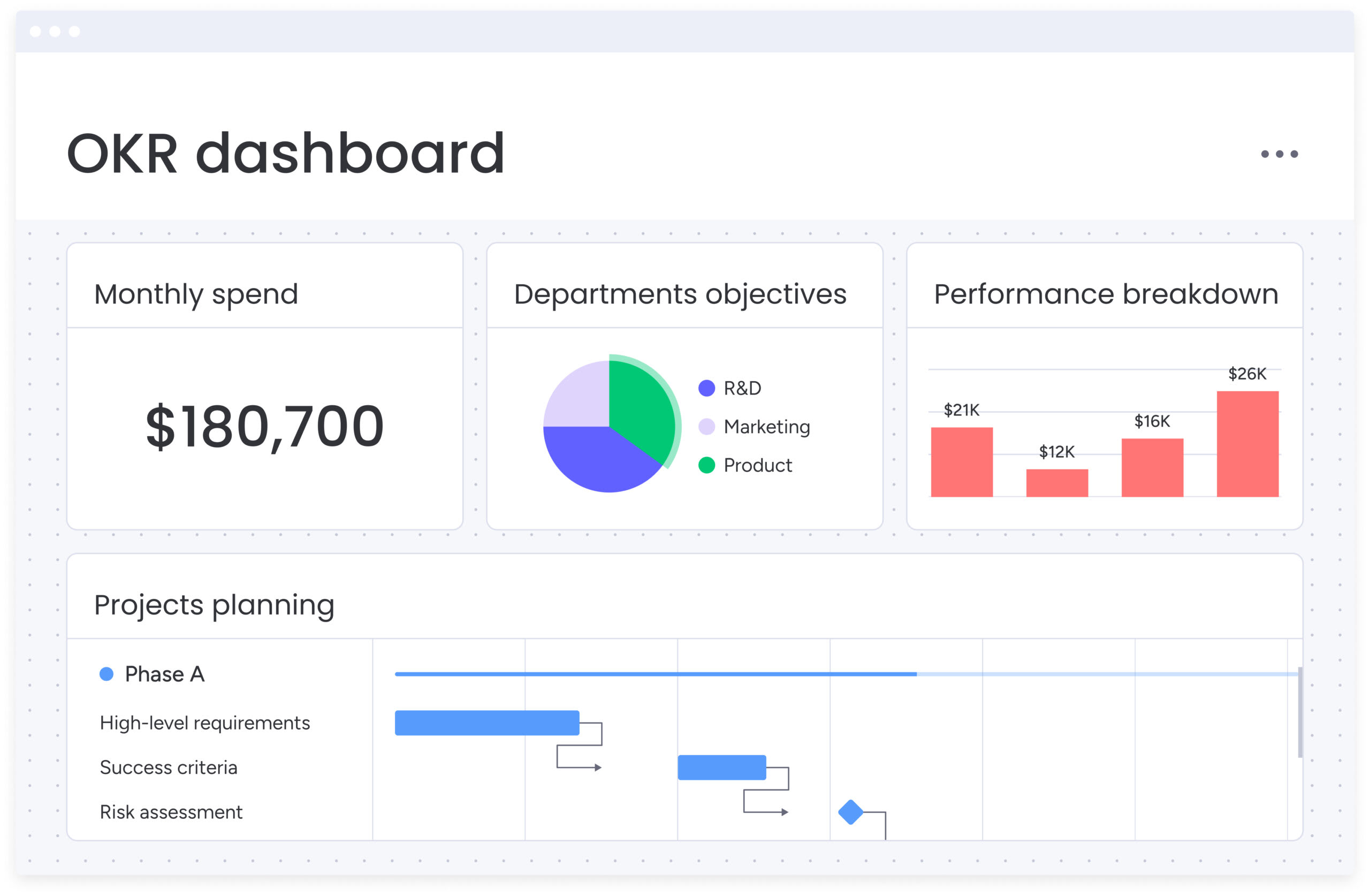
8. Iterate and improve
Embrace continuous improvement by running retrospectives after project phases. What went well? What could be improved? How will you apply these lessons?
Implement lessons learned to avoid repeating mistakes in future projects. Document both successes and failures to build organizational knowledge.
9. Adopt the right tools
Choose technology that fits your team’s needs and workflows rather than forcing processes to match available tools. The right platform should adapt to how your team works.
Evaluate project management solutions for flexibility, scalability, and user-friendliness. Consider how well they integrate with your existing technology ecosystem.
monday work management’s customizable platform adapts to different project methodologies, providing flexibility for all project types.
10. Focus on finalizing and learning
Follow proper project closeout procedures to wrap up work completely and transition deliverables to operations teams or clients. Don’t rush through this final phase.
Document lessons learned and share them with the broader organization. Celebrate successes and acknowledge contributions to boost team morale and engagement.
Turning principles into action with a modern work platform
Technology enables the implementation of project management principles by streamlining processes and improving visibility. Are your teams still juggling spreadsheets and emails to manage complex projects?
Best practice project management principles become more achievable with integrated platforms that create a central hub for all project information. This centralization reduces miscommunication and increases efficiency.
Modern work platforms provide several key capabilities:
- Centralized information: Eliminating silos and improving cross-team visibility
- Automated workflows: Reducing manual work and increasing process consistency
- Real-time collaboration: Enhancing team coordination regardless of location
- Customizable processes: Adapting to specific organizational methodologies
monday work management embodies these capabilities, making it easier to apply project managment principles pmi recommends across multiple teams and projects.
Try monday work managementEmpower teams with AI and automations
AI enhances project management by automating routine tasks and providing actionable insights. The evolution from manual to automated processes transforms how teams work—are you leveraging these advances?
PMP principles and PMI principles become easier to implement with AI assistance, freeing teams to focus on strategic work rather than administrative tasks.
AI applications in principal project management include:
- Predictive analytics: Forecasting potential issues based on historical patterns
- Resource optimization: Suggesting optimal team assignments based on skills
- Automated reporting: Generating insights without manual data gathering
- Risk identification: Spotting patterns and anomalies that humans might miss
monday work management’s AI features help teams work smarter by automating routine tasks like status updates and deadline reminders. The platform’s AI capabilities analyze historical performance, identify potential bottlenecks before they occur, and recommend resource allocation adjustments — all driving more informed, data-backed decision-making without requiring manual analysis.
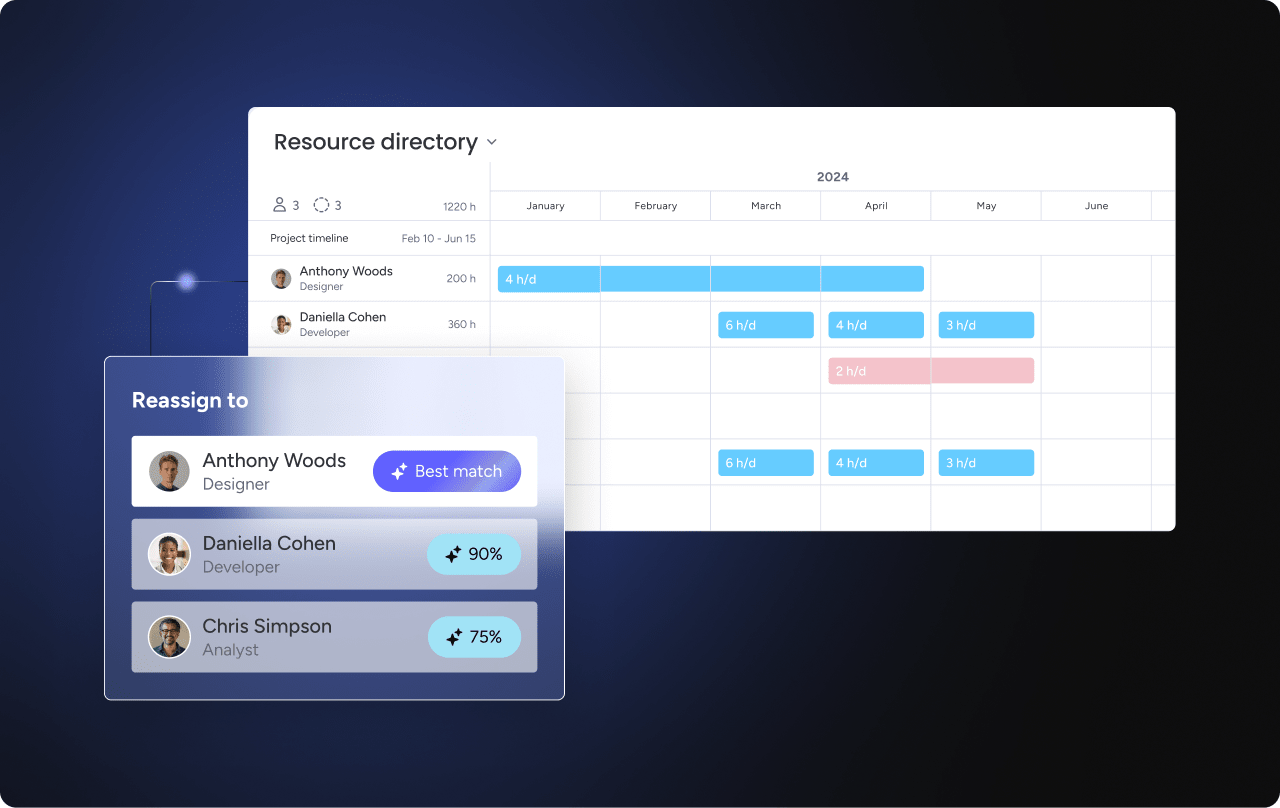
Teams can leverage these intelligent features to focus on strategic work rather than administrative overhead, ultimately transforming how project management principles are implemented and and executed across the organization.
FAQs
How do project management principles apply to remote teams?
Project management principles are especially crucial for remote teams as they provide structure and clarity when face-to-face interaction isn't possible. Virtual collaboration platforms like monday work management help remote teams implement these principles through centralized communication and visibility.
How can AI help streamline project management processes?
AI enhances project management by automating routine updates, identifying potential risks before they become issues, and providing data-driven insights for decision-making. monday work management's AI capabilities analyze patterns across projects to suggest optimizations and improve workflow efficiency.
What is the difference between project management principles and project management methodologies?
Project management principles are universal guidelines that apply across all projects, while methodologies are specific frameworks for implementing those principles. Principles focus on what should be done, while methodologies detail how to do it within particular contexts or industries.
How should organizations handle constantly changing project scope?
Organizations with frequently changing scope need robust change management processes built into their project methodology. monday work management's flexible platform allows teams to adapt to changes while maintaining visibility and accountability throughout the process.
How can project managers align stakeholders with project management principles?
Project managers can align stakeholders by demonstrating the value of project management principles through clear communication and visible results. monday work management's dashboards help visualize progress and outcomes, making it easier to gain stakeholder buy-in for structured approaches.
Why are the 12 principles of project management important?
The 12 principles of project management provide a comprehensive framework that guides project teams through complexity, ensures stakeholder value, and promotes adaptability. These principles help organizations deliver consistent results regardless of project type or industry, creating a foundation for repeatable success.
